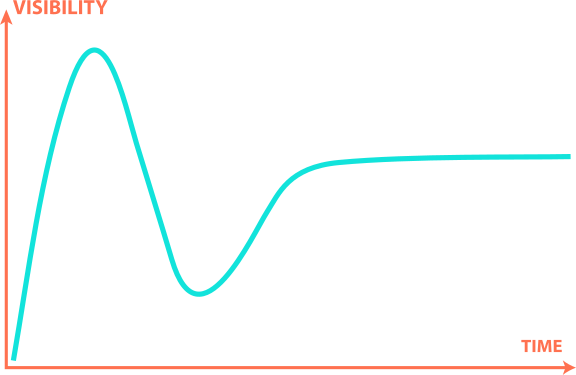Challenges for Delivering Machine Learning in Health
Neil D. Lawrence
2017-02-28
Deep Learning in Healthcare Summit 2017
2017-02-28
Neil D. Lawrence
Amazon and University of Sheffield
@lawrennd inverseprobability.com
Gartner Hype Cycle

Background: Big Data
The pervasiveness of data brings forward particular challenges.
Those challenges are most sharply in focus for personalized health.
Particular opportunities, in challenging areas such as mental health.
Evolved Relationship
Effects
This phenomenon has already revolutionised biology.
Large scale data acquisition and distribution.
Transcriptomics, genomics, epigenomics, ‘rich phenomics’.
Great promise for personalized health.
Challenges
Paradoxes of the Data Society
Quantifying the Value of Data
Privacy, loss of control, marginalisation
Breadth vs Depth Paradox
Able to quantify to a greater and greater degree the actions of individuals
But less able to characterize society
As we measure more, we understand less
What?
Perhaps greater preponderance of data is making society itself more complex
Therefore traditional approaches to measurement are failing
Curate’s egg of a society: it is only ‘measured in parts’
Wood or Tree
- Can either see a wood or a tree.

Examples
Election polls (UK 2015 elections, EU referendum, US 2016 elections)
Clinical trials vs personalized medicine: Obtaining statistical power where interventions are subtle. e.g. social media
Large \(p\), Large \(n\)
For large \(p\) the parameters are badly determined.
Large \(p\) small \(n\) problem.
- Easily dealt with through definition.
Breadth vs Depth
Modern Measurement deals with depth (many subjects) … or breadth lots of detail about subject.
- But what about
- \(p\approx n\)?
- Stratification of populations: batch effects etc.
- Challenge around combination of data sets.
- E.g. multi-task learning
- Massively missing data
Also need
- More classical statistics!
- Like the ‘paperless office’
A better characterization of human (see later)
- Larger studies (100,000 genome)
- Combined with complex models: algorithmic challenges
Quantifying the Value of Data
There’s a sea of data, but most of it is undrinkable

We require data-desalination before it can be consumed!
Data — Quotes from NIPS Workshop on ML for Healthcare
- 90% of our time is spent on validation and integration (Leo Anthony Celi)
- “The Dirty Work We Don’t Want to Think About” (Eric Xing)
- “Voodoo to get it decompressed” (Francisco Giminez)
- In health care clinicians collect the data and often control the direction of research through guardianship of data.
Value
- How do we measure value in the data economy?
- How do we encourage data workers: curation and management
- Incentivization for sharing and production.
- Quantifying the value in the contribution of each actor.
Embodiment: Data Readiness Levels
Three Bands of Data Readiness:
Band C - accessibility
Band B - validity
Band A - usability
Accessibility: Band C
- Hearsay data.
- Availability, is it actually being recorded?
- privacy or legal constraints on the accessibility of the recorded data, have ethical constraints been alleviated?
- Format: log books, PDF …
- limitations on access due to topology (e.g. it’s distributed across a number of devices)
Validity: Band B
- faithfulness and representation
- visualisations.
- noise characterisation.
- Missing values.
- Example, was a column or columns accidentally perturbed (e.g. through a sort operation that missed one or more columns)? Or was a gene name accidentally converted to a date?
Usability: Band A
- The usability of data
- Band A is about data in context.
- Consider appropriateness of a given data set to answer a particular question or to be subject to a particular analysis.
Recursive Effects
- Band A may also require
- active collection of new data.
- annotation of data by human experts
- revisiting the collection (and running through the appropriate stages again)
Also …
Encourage greater interaction between application domains and data scientists
Encourage visualization of data
Incentivise the delivery of data.
Privacy, Loss of Control and Marginalization
Society is becoming harder to monitor
Individual is becoming easier to monitor
Discrimination
Marketing can become more sinister when the target of the marketing is well understood and the (digital) environment of the target is also so well controlled
Potential for explicit and implicit discrimination on the basis of race, religion, sexuality, health status
All prohibited under European law, but can pass unawares, or be implicit
Marginalization
- Credit scoring, insurance, medical treatment
- What if certain sectors of society are under-represented in our aanalysis?
- What if Silicon Valley develops everything for us?
Digital Revolution and Inequality?

Amelioration
- Work to ensure individual retains control of their own data
- We accept privacy in our real lives, need to accept it in our digital
Control of persona and ability to project
Need better technological solutions: trust and algorithms.
Conclusion
- Data science offers a great deal of promise for personalized health
- There are challenges and pitfalls
- It is incumbent on us to avoid them
Many solutions rely on education and awareness
Thanks!
- twitter: @lawrennd
- blog: http://inverseprobability.com